Diplomacy, espionage and Indian foreign policy making
 Dr Kamal Wickremasinghe Dr Kamal Wickremasinghe
Public officials in Sri Lanka, especially the counter-intelligence
establishment, will probably need to be spending a lot of time in
analysing the background to the expulsion by Russia last week, of an
American CIA officer operating under diplomatic cover.

The spy arrested near a Moscow park, wearing a blond wig, was
allegedly trying to recruit a Russian intelligence services officer
responsible for fighting Islamist terrorists in the Caucasus region. The
Russian Federal Security Service (FSB) named the man as Ryan C. Fogle,
third Secretary at the US embassy in Moscow. Footage aired on the
English-language TV channel Russia Today showed Fogle being paraded. He
is alleged to have in his possession two other wigs, three pairs of
glasses, and a kitbag of spy equipment, stacks of €500 notes and his US
embassy identity card.
|
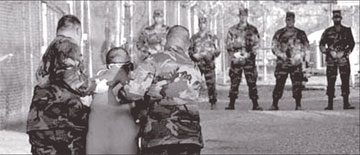
Guantanamo Bay prison in Cuba |
He was carrying a recruitment note written in Russian to the targeted
official offering “up to $1 million a year, with additional bonuses”,
together with instructions on how to transfer information. The would-be
target had ‘set Fogle up’, trapping him red-handed.
Upon his arrest, Russia’s Foreign Ministry summoned US Ambassador
Michael McFaul for an urgent meeting and ordered the arrested man’s
immediate departure from the country.
The arrest of the spy comes in the middle of renewed US demands for
Russian help, following the thawing of relations in the wake of Boston
bombing, to end their seemingly unwinnable proxy-war in Syria, but
ensuring regime change. Russia displayed their contempt by announcing
the sale of advanced anti-aircraft missiles to Syria the day after John
Kerry left Moscow after lodging the request.
The expulsion of the CIA spy took place just days after the British
Prime Minister David Cameron met Mr Putin in Moscow with similar
requests. The spy was being paraded on television while Mr Putin was
meeting with the Israeli Prime Minister Benyamin Netanyahu, the other
player in the tri-partite “special relationship”, in the southern
Russian city of Sochi.
|
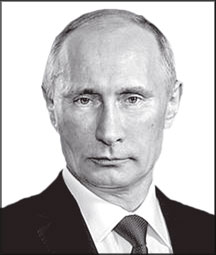
Vladimir Putin |
Russian officials expressed “surprise” at the attempt to recruit a
security officer responsible for fighting Islamist terrorists in the
Caucasus after Russia had announced cooperation on the issue. The
ministry said the arrest “raises serious questions for America”, since
“such provocative actions in no way help to strengthen mutual trust.”
The only surprise element in the affair, from the point of view of
other countries familiar with the activities of such US ‘diplomats’, is
that the Russians were surprised by the attempted spy recruitment
episode, suggesting that they had placed a certain amount of trust in
the honesty and integrity of the neocon-ruled US.
Of course, it is ‘par for the course’ for the neocons to deploy
operatives under diverse guises, in foreign countries, some going by
their real identities using diplomatic cover, and others under
“non-official cover” of assumed identities totally dissociated with the
US government. Their unethical and illegal subterfuge of foreign nations
and their governments is founded on the deployments of such agents to
recruit corruptible local elements.
While throwing the canard of “advanced” satellite and other technical
intelligence as the source of their information, their most-favoured
method still is “buying-out” local bureaucrats and military officials
with influence, and others with access to sensitive information and
higher echelons of governments or capacity to organise NGO type activity
– eavesdropping can never substitute for HUMINT!
|
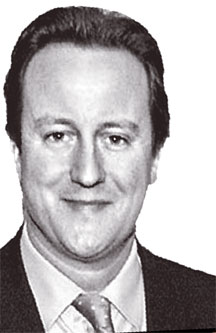
David Cameron |
Sri Lanka and India are vulnerable to similar attempts by the neocons
This particular incident deserves the attention of Sri Lanka not only
due to the current, similar neocon activities in Sri Lanka that clearly
pose risks, but also due to the already well known neocon infiltration
of the Indian bureaucracy that is bound to have serious repercussions on
our all-important relationship with India.
Though seems unlikely at the first blush, similar activities were
behind India’s dramatic, totally inexplicable vote, twice, in favour of
the US sponsored anti-Sri Lanka resolution at the UNHRC in Geneva,
‘against the flow’ of amicable bilateral relations between our two
countries.
|
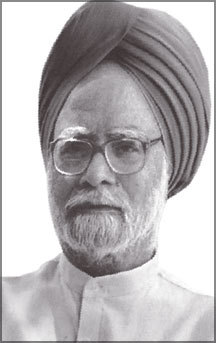
Manmohan Singh |
Understanding the important dynamic of the influence of the key
members of the Indian Foreign Service (IFS) in foreign policy decision
making in Delhi, and their vulnerability to neocon approaches helps
realise that the US role in the event is not at all far-fetched.
Different sets of undercurrents other than the widely-known domestic
political considerations drove India’s vote at the UNHRC in 2012 and
2013 - the ‘friends’ of the neocons had a significant effect on the 2012
decision. The agents were quickly identified and their future influence
was ameliorated through the quick actions of the patriotic forces within
the IFS. The determining conditions that prevailed in 2013 to yield the
same result however, were different.
The dynamics that governed India’s vote go right down to the roots of
the political-bureaucratic complex consisting of three agencies that
churns out Indian foreign policy - the prime minister’s office (PMO);
the National Security Council (NSC) led by the national security
adviser; and the Ministry of External Affairs (MEA).
The PMO has been sitting at the apex of the Indian foreign affairs
pyramid since the days of Jawaharlal Nehru who formulated India’s
non-aligned, nonviolence-based foreign policy. He was also the Minister
of External Affairs, and had a strong personal role in making all major
foreign policy decisions himself, after consultations with the
bureaucracy.
The role of the PMO in foreign policy and decision making further
expanded during the regimes of Lal Bahadur Shastri (1964-66), Indira
Gandhi (1966-77 and 1980-84) and, Rajiv Gandhi (1984-89), with the
Research and Analysis Wing within the PMO almost becoming the primary
information provider.
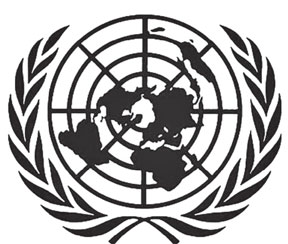
However, senior civil servants of the elite IFS (usually identified
by their graduation year as much as by their name!) staff all three arms
and exert significant influence through information filtering and subtle
psychological techniques.
Unlike in the US,there are no political appointees among the foreign
policy mandarins. Apart from Prime Minister Manmohan Singh’s removal of
Cabinet Secretary Kamal Pande in June 2004, political appointments and
sackings of IFS officers are rare.
The problem with the Indian civil service today is that it does not
differ much at all from the British colonial civil service, the “steel
frame” of British imperialism, India inherited at independence and still
resort to largely colonial methods of public administration.
The IFS that recruits just 0.01 per cent of aspirants is the most
elite of the public services; Those who survive the cut-throat
admissions and promotions processes of the IFS go on to secure key
positions as advisers in the PMO, on the National Security Council, and
at the MEA.
The policy making and advisory process by IFS officers takes place in
an environment lacking significant collective strategic thinking, as is
common in Western countries, including the dreaded think tanks; the
process in India is highly individualistic.
The system does not put out white papers or other formal documents
that set out the country’s long-term foreign policy goals, nor does the
system produce any guidelines for policy making except for the
overarching policy framework expressed in parliamentary statements and
speeches, also written by the same bureaucrats. Like with all
organisations, the three arms of government, all housed in the imperious
South Block, are prone to many personal rivalries, ‘turf wars’ and
intrigue that take special proportions due to the high level of freedom
enjoyed by bureaucrats. Those who know to ‘read’ can clearly see how
different forces are reflected in final policy decisions.
Rumours of IFS officers working as US agents are rife at the South
Block
Such a policy making environment is obviously ripe for US
exploitation, and the first Obama administration recognised this in 2009
when they announced a policy of “intense engagement” with India, built
around the so-called India-US “Strategic Dialogue”, with none other than
Sri Lanka’s “friend” Robert O. Blake appointed as assistant secretary
for South Asian affairs at the state department.
The components of the Strategic Dialogue include India-US-Afghanistan
trilateral process, the Joint Working Group on Space - including
exploration of Mars - and the Indo-Pacific Economic Corridor, and
India’s role in maritime security. All such initiatives involve the
future protection of American interests in the region such as future of
Afghanistan after the planned troop withdrawal and the future of Diego
Garcia after the expiry of the “$1 lease” from the UK in 2016.
Also involved are key defence trade elements with significant
resource transfers to the US through Indian defence purchases,
accounting for much of bilateral trade currently worth around $100
billion.
The hectic arms trade being pushed by the military-industrial complex
with full support of the US embassy, with hefty incentives, commissions
and outright bribes on offer, is bound to corrupt the occasional IFS
officer, or two, and there are legendary stories of corruption with some
captured on camera.
The rumours often surround people at the top, like the recently
deceased Brajesh Mishra, who was India’s permanent representative to the
UN, and later held the positions of principal secretary to the Prime
Minister Atal Bihari Vajpayee, and India’s first national security
adviser (1998 – 2004) concurrently, after entering BJP politics.
There are many in the IFS who believe that Mishra’s strong push for
severing traditional relations with Russia and moving towards closer
ties with the US was based on special’ relations he had with certain US
diplomats in Delhi at the time.
Wikileaks puts some in trouble
Another IFS official whose name pops up in a number of confidential
Wikileaks cables is that of Dr. S. Jaishankar, India’s current
Ambassador to China who has previously worked in Moscow, Washington,
Budapest, Tokyo, Prague and Singapore.
He was head of the Americas Division at the MEA from 2004 to 2007. He
has worked in Sri Lanka also, from 1988 to 1990 as Political Advisor to
the Indian Peace Keeping Force (IPKF), and was considered as replacement
to Mr Kantha before the final selection of Y.K. Sinha. Dr. Jayashankar
figures prominently in a number of ‘Wikileaked’ US diplomatic cables in
different contexts, written by different US diplomats in Delhi, Colombo
and Tokyo, to the state department.
In a confidential cable dated January 9, 1989 (89COLOMBO158), the
then US ambassador in Colombo, James W. Spain passed on to Washington
the assessment of Jaishankar whom he described as a "working-level
Indian high commission official who deals most closely with all aspects
of India's role in North Eastern province", as presenting a sober view
of current strength of the LTTE.
In another cable dated April 25, 2005 (31383), Delhi Charge
d'Affaires Robert O. Blake, Jr. writes in typically arrogant fashion
that "Jaishankar called the US embassy to make sure we had noticed" the
GOI's vote(against the Cuba-sponsored UNHRC resolution condemning US
practices at Guantanamo).
In another cable dated December19 2005 (05NEWDELHI9514) written prior
to the departure of the then Indian Foreign Secretary Shyam Saran on an
official visit to Washington, Blake informs the state department of
India's 'game plan' during meetings, as "revealed" to him by Jaishankar.
The most recent revelation of Dr Jaishankar's apparently 'cushy'
relationship with the Americans came in the form of a Wikileaks cable
sent in February 2010 by the US ambassador to Beijing, Jon Huntsman,
informing the state department that the Indian ambassador Jayashankar
had sought "closer co-operation with the US"to curb "China's aggressive
approach" to neighbouring countries.
The crucial player in the 2012 UNHRC vote was Ranjan Mathai
The decision by India to vote for the US resolution against Sri Lanka
at the UNRC in Geneva in March 2012, albeit a much diluted version of
the original produced by the US, was significant not just because it was
against Sri Lanka: it marked the departure from the long standing Indian
stance of not voting for resolutions critical of individual member
countries. The change was the personal influence of Ranjan Mathai who
was appointed Foreign Secretary just months before, in August 2011.
Ranjan Mathai, a Keralite is a veteran of nearly 40 years in the IFS
with postings as Ambassador almost exclusively in western capitals,UK,US,
France, Belgium,and client states such as Israel (1998 to 2001) and
Qatar (2001 to 2005). He has previously served in Colombo, and has been
Head of a Division at the DEA dealing with Bangladesh, Sri Lanka,
Myanmar and the Maldives.
Soon after becoming Secretary, Mathai launched, with gusto, a new
foreign policy agenda for India which he announced at the release of a
book titled 'India's Neighbourhood Challenges in the Next Two Decades',
at the Institute for Defence Studies and Analyses (IDSA).
Ranjan Mathai's new vision for India essentially reflected a new US
defence strategy outlined by the then US Defence Secretary Leon Panetta,
a hawkish neocon and formerly the Director of the CIA, at IDSA just six
months ago. Mathai, considered a great friend by the neocon
establishment, sounds ideologically completely persuaded by the US
rhetoric and the primary premise that the geo-political situation in
India's neighbourhood would change drastically in the next two decades
and will present a "challenging" environment,a position most untypical
of the traditional Indian approach.
Mathai's proposed policy was heading towards making India part of the
Asia Pivot Penetta was minting, and was aimed at making India America's
'deputy sheriff' in South Asia. The model completely ignored India's
strong historical,cultural, and other influences on the region.
Mathai's "brave new world" approach did not withstand scrutiny, and
there is no mention of it any more at the PMO. His influence waned
together with the demise of his moves to make US the ruler of the
region. Currently, according to reliable sources, Mathai is excluded
from decisions relating to appointments of envoys. During his heyday
however, in early 2012, he dictated the Indian vote on Sri Lanka at the
UNHRC, on American instructions.
In 2013, Ranjan Mathai initiated the first formal consultations
visited Washington DC between February 20 and 22 and spent nearly three
hours at the state department with Under Secretary for Political Affairs
Wendy Sherman, an operative with strong links to Madeline Albright.
What mattered most in relation to the Sri Lankan vote in 2013
however, was not Mathai's influence but the 'hotter' political climate
in Tamil Nadu, together with Dilip Sinha, India's ambassador to the UN,
a cousin of Mrs Kantha, playing a leading role.
Winds are changing
Ranjan Mathai is due to retire at the end of July, with Prime
Minister Manmohan Singh due to make an announcement soon on the
appointment of his replacement.
It will be either Sujatha Singh, current ambassador to Germany, or S.
Jayashanker currently in China, with an outside chance of a one year
extension of term for Mathai.
If Dr S Jaishankar, (IFS 1977 batch) becomes next secretary, Sri
Lanka can expect a bumpy ride, with US finding a cat's paw in Delhi to
assert neocon wishes in Sri Lanka. But like Mathai did, he will face
opposition.
Due to the same dynamic, the incoming Indian High Commissioner Mr Y.K.
Sinha, currently the head of a Division dealing with Pakistan and Iran
affairs at the MEA will face circumstances similar to what Mr Kantha
faced.
When it comes to crucial issues on Sri Lanka,Mr Sinha will have
limited influence and his commission will be, as a good diplomat, to
manage the aftermath. Our empathy will probably make his job easier. |





